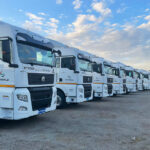Talking a big game
Talking a big game
President Cyril Ramaphosa has been big on promises, but will he follow through on these promises with any real action? CHRIS HATTINGH has his doubts.
At the start of the latest iteration of the annual Investing in African Mining Indaba, President Cyril Ramaphosa told those in attendance: “We will unlock massive new investment in SA’s rail system. This will support jobs in the economy through mining, trade, and agriculture. As government, we have been open that without bold transformative reforms to the logistics sector, mining cannot flourish.”
During his address, the president also signalled that reforms in energy and logistics were urgently needed. His words are promising and seemingly an acknowledgement of the many challenges afflicting not only the mining sector, but industry at large. However, South Africa’s macro trade infrastructure, budgetary constraints, and a looming election mean these kinds of reforms may take a backseat throughout 2024.
Also at the Mining Indaba, Andrew Shaw, the chief strategy and planning officer at Transnet, told delegates the state-owned logistics company plans to open up third-party access to the rail network from April this year. This is exceedingly welcome news, although the devil will be in the details in terms of what conditions will be in place, who will ultimately own the infrastructure, what the requirements for investment and bidding are, and so on.
“The idea is for third-party access to the network so that additional operators can operate and compete with the state-owned operator and provide services to a multitude of customers,” Shaw elaborated.
According to the South African Association of Freight Forwarders (SAAFF), inefficiencies in rail have cost the country R1 billion per day, while problems at the ports have amounted to a loss of R200 million per day. It is therefore imperative that the reforms the president talks about are pursued without any more delays.
South Africa’s state-owned companies, as well as many government departments, were severely damaged during the years of state capture. Skills, administrative capacities, budgets, and more have become constrained. The fiscal side of matters especially may become yet more difficult in the context of constrained economic growth and spending priorities. To expect rapid turnarounds from state entities – especially Transnet – would be unrealistic.
Along with the factors listed above that hold back reforms, the context of national and provincial elections should also be factored in. Powerful individuals in government – along with various interest groups and players with vested interests – will exert pressures and influence to protect their own interests (even if those interests supersede the economic prospects of the country as a whole). For a party such as the ANC (currently the country’s ruling party but under ever more pressure as the elections approach), it will be difficult to balance various interests and power players.
The mining sector accounts for 6% of South Africa’s GDP and employs more than 437,000 people. The impact of the rail and port problems on this sector are clear to see – even more so than their impacts on the wider economy.
But apart from the hard numbers, these problems undermine South Africa’s reputation as a trade hub for sub-Saharan Africa. Once lost, it is difficult to regain one’s reputation in this regard (if, indeed, it is ever possible to truly regain original levels of trust). Governments and businesses in other countries will prefer to trade with countries that have reliable and safe infrastructure, investment, and macroeconomic policies. South Africa risks placing itself in a much weaker trade position over the medium-to-long term.
Throughout his many State of the Nation Addresses (SONAs), Ramaphosa has delivered numerous promises, plans, compacts, and talk of a “New Dawn”. Whether business believes any new promises in the latest SONA is ultimately up to them. But, given the factors detailed above – along with the massive focus that is always placed on an election and which takes energy away from other endeavours – it is difficult to believe that much in terms of positive reform will take place this year, before the elections (likely to be in May). Businesses that do not want to wait, only to be overtaken by competition in other countries, should listen to the SONA and other government presentations, and continue with their alternative plans and solutions.
Published by
Chris Hattingh
focusmagsa




 FUSO: Driving the Future of Mobile Healthc
FUSO: Driving the Future of Mobile Healthc



 New Electric Van Range Unveiled!
New Electric Van Range Unveiled!  A brand
A brand




 Wondering about the maximum legal load for a
Wondering about the maximum legal load for a 
 The MAN hTGX powered by a hydrogen combus
The MAN hTGX powered by a hydrogen combus


 Exciting News for South African Operators
Exciting News for South African Operators







